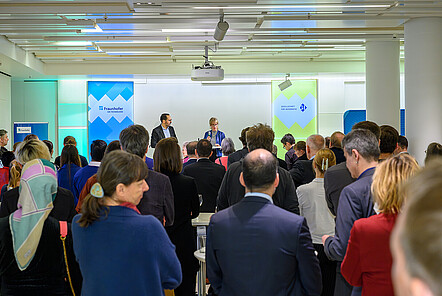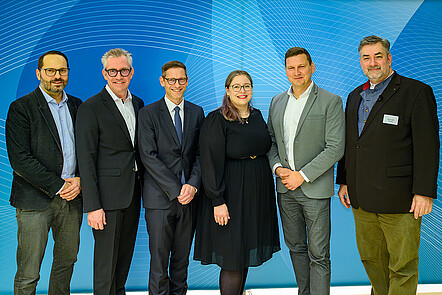The Research Data Management Infrastructure in informatics is key to the discipline
One of the hot topics at the New Year's welcome reception of the German Informatics Society and the Fraunhofer ICT Group in Berlin was the state of the Research Data Management Infrastructure in Germany. Mario Brandenburg, Parliamentary State Secretary at the Federal Ministry of Education and Research in Germany empasizes the importance of the Research Data Act: For excellent research and innovation, we need high-performance research infrastructures and accessible data.
The state of the Research Data Management Infrastructure in Germany and the importance of computer science (CS) in creating such an infrastructure was one of the main topics at the New Year‘s Welcome Reception of the German Informatics Society and the Fraunhofer ICT Group in Berlin. Mario Brandenburg, Parliamentary State Secretary at the Federal Ministry of Education and Research in Germany empasizes the importance of a Research Data Act and the plans of the Federal Government to pass the law within this legislature: For excellent research and innovation, we need high-performance research infrastructures and accessible data.
Dr. Katharina Weitz, vice president of the German Informatics Society: "For the scientific discipline of computer science research data is key. Therefore, it is very important to make it possible to identify, define and finally deploy services to store complex domain-specific data objects from the specific variety of sub-domains from computer science and to realize the FAIR principles across the board. This includes producing reusable data objects specific to the various types of computer science data which contain not only this data along with the related metadata but also the corresponding software, context and execution information in a standardized way. That is the mission of the NFDIxCS consortium, a group of more than thirty institutions that are shaping the National Research Data Infrastructure for and with Computer Science."
Daniel Krupka, Managing Director of GI and Co-Applicant of NFDIxCS: "The mission of NFDIxCS is threefold: First, we will promote the implementation of the FAIR data principles for informatics research data and software artefacts, simplify the citation of software and data, and thus modernize the publication processes and culture of both informatics and its applications. Therefore we provide a forum for the discussion of informatics research data formats, metadata formats and semantics. We will work towards generally accepted standards, in particular for the sustainable storage, retrieval and availability of informatics research data. Second, in collaboration with other scientific disciplines, we will support the application of informatics methods e.g. in the areas of high-performance computing and computer architecture, which in turn will contribute to the further development of genuine informatics methods. And third, we will share the experience and knowledge of the informatics community on system architectures, processes, standards for interoperability, data-oriented scientific publication and communication systems with all interested scientific disciplines."




